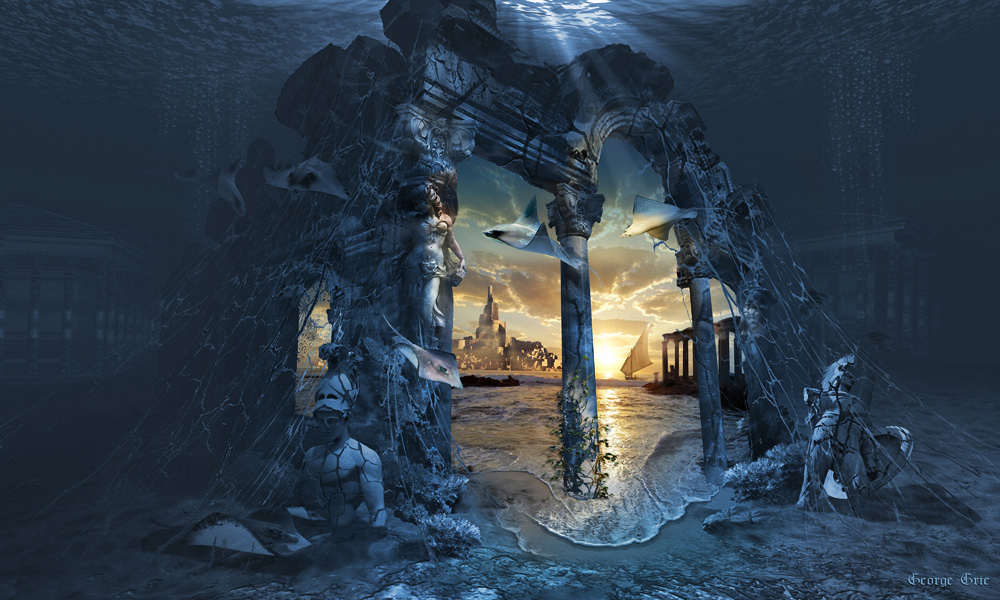In the fourth in his series on philosophy and urbanism Andreas Markides unpicks the myth of Atlantis
 The myth of Atlantis is probably known by most people and the story has been so captivating that some people have even gone in search of the lost city. However, very few people will have paid due attention to the word ‘myth’ which is very significant because that is exactly what Atlantis is -a myth!
The myth of Atlantis is probably known by most people and the story has been so captivating that some people have even gone in search of the lost city. However, very few people will have paid due attention to the word ‘myth’ which is very significant because that is exactly what Atlantis is -a myth!
It comes as a surprise to most people to know that Atlantis only existed in the imagination of Plato. One would have expected Plato to be tackling philosophical questions such as ‘what is justice?’ and ‘how can one lead a moral life?’ – and yet, with Atlantis, he appears to be indulging in what must have seemed at the time to be science fiction.
However, there are very good reasons for Plato’s indulgence. His Atlantis story is not merely science fiction, it is as relevant to our world today as it was to Athens in 5th century BC, when Plato wrote this myth. The story appears in one of his many dialogues (which are actually a lot of fun and not the heavy reading that one might fear and expect) called CRITIAS and it goes like this:
A very, very long time ago there used to be a land which was the closest place to Heaven on earth. The wealth of the kings of Atlantis was staggering; their mineral resources were excellent; there was a plentiful supply of timber; every kind of domesticated and wild animal, including elephants, and the earth produced food in abundance.
Atlantis had temples, gardens, gymnasia, a hippodrome, a palace and a harbour. There was also an artificial ditch which channelled the river waters from the mountains to the city and onto a network of canals that provided transport infrastructure as well as irrigation. There were barracks for the soldiers and housing settlements for all the people – Plato makes no mention of high-rise towers with exclusive apartments targeted at overseas sheikhs and oligarchs -but let us stay with the story!
One of the most fascinating aspects of the story is Plato’s attempt to define what he considers to be an ‘ideal place’ – something which he repeatedly does in much of his writing. In addition to laws and governance, he goes into a lot of detail describing the physical characteristics of such a place which (he says) should have temples, orchards, a water system, a grid structure (was he thinking of Milton Keynes?), a certain number of residential units and so on… Does this attempt by Plato to define a place in its physical manifestation sound familiar to the urbanists and city-makers of today?
Does this attempt by Plato to define a place in its physical manifestation sound familiar to the urbanists and city-makers of today?
In fact in another of his dialogues Plato even calculates how many people should inhabit the ideal place. In his view there is one perfect number; if below or above that number the city harmony would be disrupted in some way. I wonder what he would have made of our modern metropolises! In any case, there is no doubt that Plato’s search for the perfect size for a human settlement is a result of his mathematical predilections and devotion to Pythagorean principles. The Pythagoreans (named after the Mathematical genius, Pythagoras) believed that everything in our universe is dictated by numbers – something which of course has subsequently been illustrated by Newton and Einstein, amongst others, even if a lot of school children today would not agree!
Returning to Atlantis – Plato informs us that the kings of Atlantis were just, wise and moral – until the inevitable moral degeneration set in and the people of Atlantis then ceased to ‘be able to carry their prosperity with moderation’. As a result, once the all-mighty god Zeus had perceived this degeneration and watched with dismay the conspicuous consumption of the people of Atlantis, he decided to punish them. This brings us onto the big catastrophe (was it a tsunami, an earthquake or a war against a foreign country – we do not know) which obliterated Atlantis. There have been hundreds of theories as to where Atlantis may lie –maybe at the bottom of the Atlantic ocean, somewhere in the Mediterranean or even in a Scandinavian fjord.
However, the important question is not where the Atlantis lies but why did Plato write such a myth? The answer is simple: he was trying to warn his fellow citizens in Athens (who by that time had achieved a great civilisation) not to rest on their laurels. He was effectively saying to them that just like the mighty Atlantis had been obliterated as a result of its citizens’ moral degradation, the very same thing could happen to Athens.
Does this myth have any relevance to us today? You might say it is a little far-fetched but I think that our world is experiencing its ‘Atlantis moment’. Leaders with no moral compass, utter devotion to material gains and our own disregard of the natural environment…
It is this last point that is of particular concern. Despite repeated pleas from modern prophets (starting with Al Gore in the early 90s, and more recently with people such as David Attenborough and even the young Greta Thunberg) we pay no heed to their warnings. As a consequence, we continue to fill our oceans with plastic, we remain glued to our cars, we hunt and kill whales in order to satisfy a peculiar culinary proclivity, we burn coal, we destroy virgin forests…
We also remain stubbornly oblivious to stark warnings from our planet itself – such as huge forest fires, the irreversible melting of the ice caps and unusual floods. Are we going to continue to ignore all these warnings, in the same way that the ancient Athenians had ignored Plato?
Is there a tsunami just round the corner awaiting to engulf our own Atlantis?
Andreas Markides AoU is the Executive Chairman of Markides Associates and former President of the Chartered Institution of Highways and Transportation.
Illustration: George Grie, CC BY-SA 4.0 https://creativecommons.org/licenses/by-sa/4.0, via Wikimedia Commons






